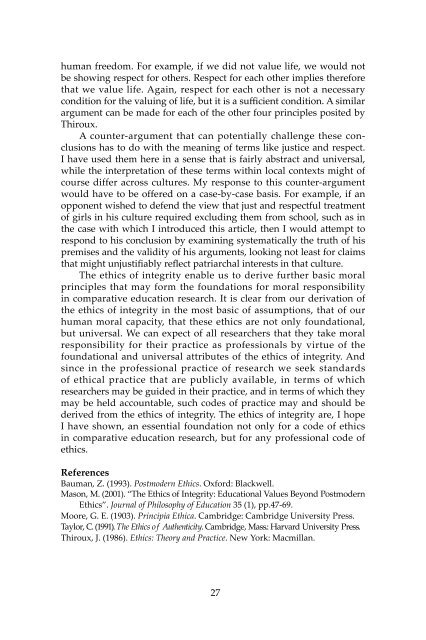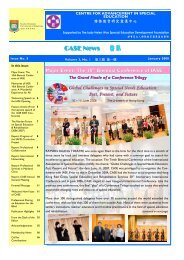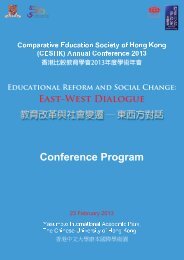Comparative Education Bulletin - Faculty of Education - The ...
Comparative Education Bulletin - Faculty of Education - The ...
Comparative Education Bulletin - Faculty of Education - The ...
You also want an ePaper? Increase the reach of your titles
YUMPU automatically turns print PDFs into web optimized ePapers that Google loves.
human freedom. For example, if we did not value life, we would not<br />
be showing respect for others. Respect for each other implies therefore<br />
that we value life. Again, respect for each other is not a necessary<br />
condition for the valuing <strong>of</strong> life, but it is a sufficient condition. A similar<br />
argument can be made for each <strong>of</strong> the other four principles posited by<br />
Thiroux.<br />
A counter-argument that can potentially challenge these conclusions<br />
has to do with the meaning <strong>of</strong> terms like justice and respect.<br />
I have used them here in a sense that is fairly abstract and universal,<br />
while the interpretation <strong>of</strong> these terms within local contexts might <strong>of</strong><br />
course differ across cultures. My response to this counter-argument<br />
would have to be <strong>of</strong>fered on a case-by-case basis. For example, if an<br />
opponent wished to defend the view that just and respectful treatment<br />
<strong>of</strong> girls in his culture required excluding them from school, such as in<br />
the case with which I introduced this article, then I would attempt to<br />
respond to his conclusion by examining systematically the truth <strong>of</strong> his<br />
premises and the validity <strong>of</strong> his arguments, looking not least for claims<br />
that might unjustifiably reflect patriarchal interests in that culture.<br />
<strong>The</strong> ethics <strong>of</strong> integrity enable us to derive further basic moral<br />
principles that may form the foundations for moral responsibility<br />
in comparative education research. It is clear from our derivation <strong>of</strong><br />
the ethics <strong>of</strong> integrity in the most basic <strong>of</strong> assumptions, that <strong>of</strong> our<br />
human moral capacity, that these ethics are not only foundational,<br />
but universal. We can expect <strong>of</strong> all researchers that they take moral<br />
responsibility for their practice as pr<strong>of</strong>essionals by virtue <strong>of</strong> the<br />
foundational and universal attributes <strong>of</strong> the ethics <strong>of</strong> integrity. And<br />
since in the pr<strong>of</strong>essional practice <strong>of</strong> research we seek standards<br />
<strong>of</strong> ethical practice that are publicly available, in terms <strong>of</strong> which<br />
researchers may be guided in their practice, and in terms <strong>of</strong> which they<br />
may be held accountable, such codes <strong>of</strong> practice may and should be<br />
derived from the ethics <strong>of</strong> integrity. <strong>The</strong> ethics <strong>of</strong> integrity are, I hope<br />
I have shown, an essential foundation not only for a code <strong>of</strong> ethics<br />
in comparative education research, but for any pr<strong>of</strong>essional code <strong>of</strong><br />
ethics.<br />
References<br />
Bauman, Z. (1993). Postmodern Ethics. Oxford: Blackwell.<br />
Mason, M. (2001). “<strong>The</strong> Ethics <strong>of</strong> Integrity: <strong>Education</strong>al Values Beyond Postmodern<br />
Ethics”. Journal <strong>of</strong> Philosophy <strong>of</strong> <strong>Education</strong> 35 (1), pp.47-69.<br />
Moore, G. E. (1903). Principia Ethica. Cambridge: Cambridge University Press.<br />
Taylor, C. (1991).<strong>The</strong> Ethics <strong>of</strong> Authenticity. Cambridge, Mass.: Harvard University Press.<br />
Thiroux, J. (1986). Ethics: <strong>The</strong>ory and Practice. New York: Macmillan.<br />
27
















